The U.K. anticipated a “serious confrontation between Russia and Ukraine” as far back as 1992, declassified files show, Phil Miller reports. One senior official even questioned whether Ukraine was “a real country.”
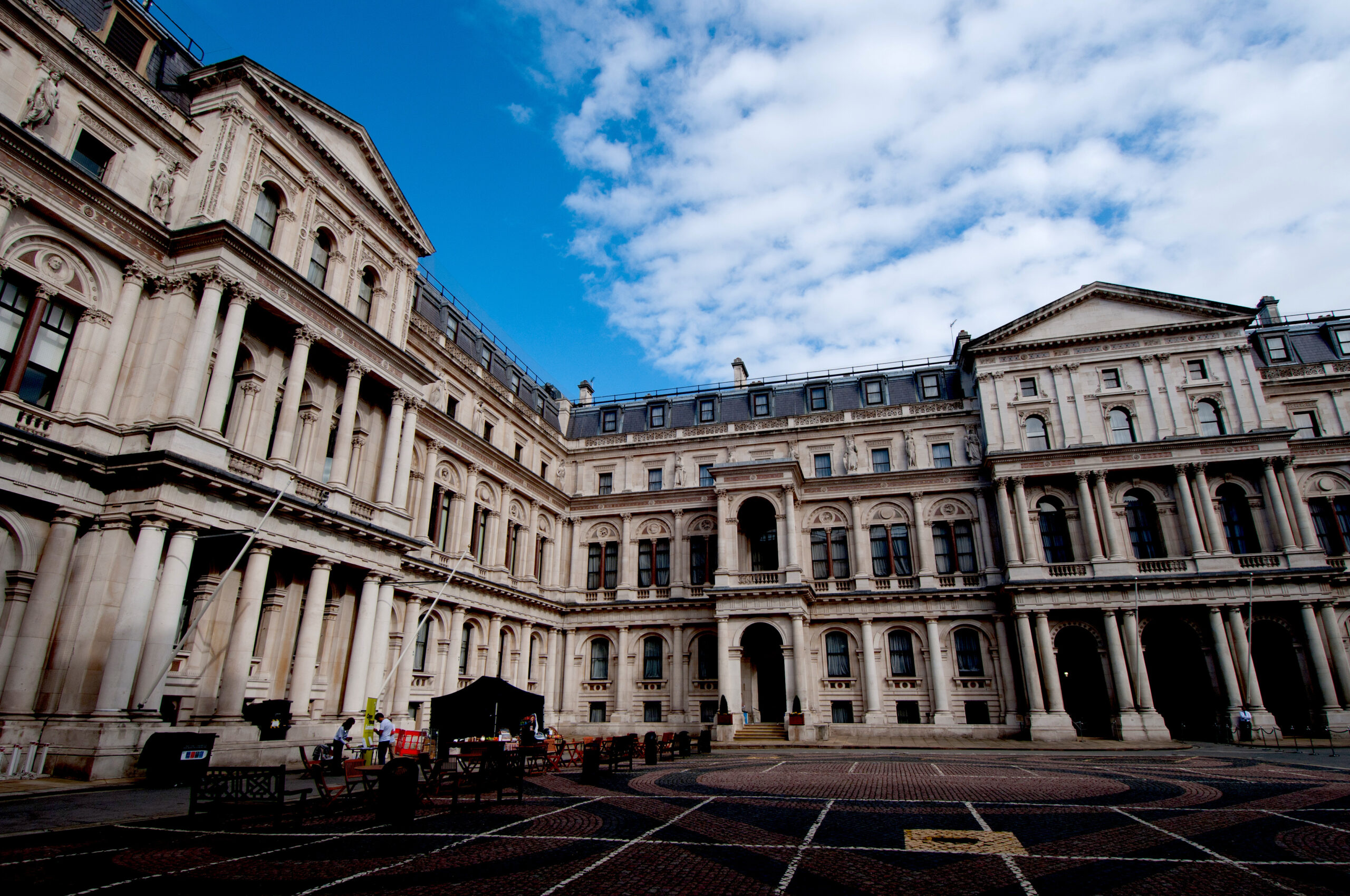
U.K. Foreign Office in London. (Chris Eason, CC BY 2.0, Wikimedia Commons)
By Phil Miller
Declassified UK
 When British intelligence warned that Russian President Vladimir Putin was about to attack Ukraine earlier this year, the spooks’ foresight won many plaudits. Yet their prediction mirrored a scenario Whitehall had long known might unfold.
When British intelligence warned that Russian President Vladimir Putin was about to attack Ukraine earlier this year, the spooks’ foresight won many plaudits. Yet their prediction mirrored a scenario Whitehall had long known might unfold.
In May 1992, just six months after the Soviet Union broke up, Britain’s then Prime Minister John Major was being briefed by his staff. They were concerned about a potential clash between Russia and Ukraine over Crimea.
The peninsula in the Black Sea had belonged to Russia until the Soviet Union gifted it to Ukraine in 1954. For the rest of the Cold War, Crimea retained a significant Russian presence, including a strategically important warm water port for the Kremlin’s navy.
Such was the strength of Russia’s legacy in the area that during the 1990s local politicians wanted a referendum on independence from Ukraine. “Most of the population in Crimea is Russian,” an advisor told Major in a handwritten note.
They warned: “If Crimea becomes independent, Ukraine’s ability to control the Black Sea fleet — based at Sevastopol — goes with it.”
Gordon Barrass, a senior U.K. intelligence official, added:
“The Ukrainians will try to prevent the referendum from being held…The issue will arouse passions among nationalists in Kiev and Moscow and could stir up inter-ethnic conflict within Crimea.”
Among those living in Crimea were the Tatars, an historic Muslim community that had been brutally oppressed under Soviet rule and wanted to remain part of Ukraine.
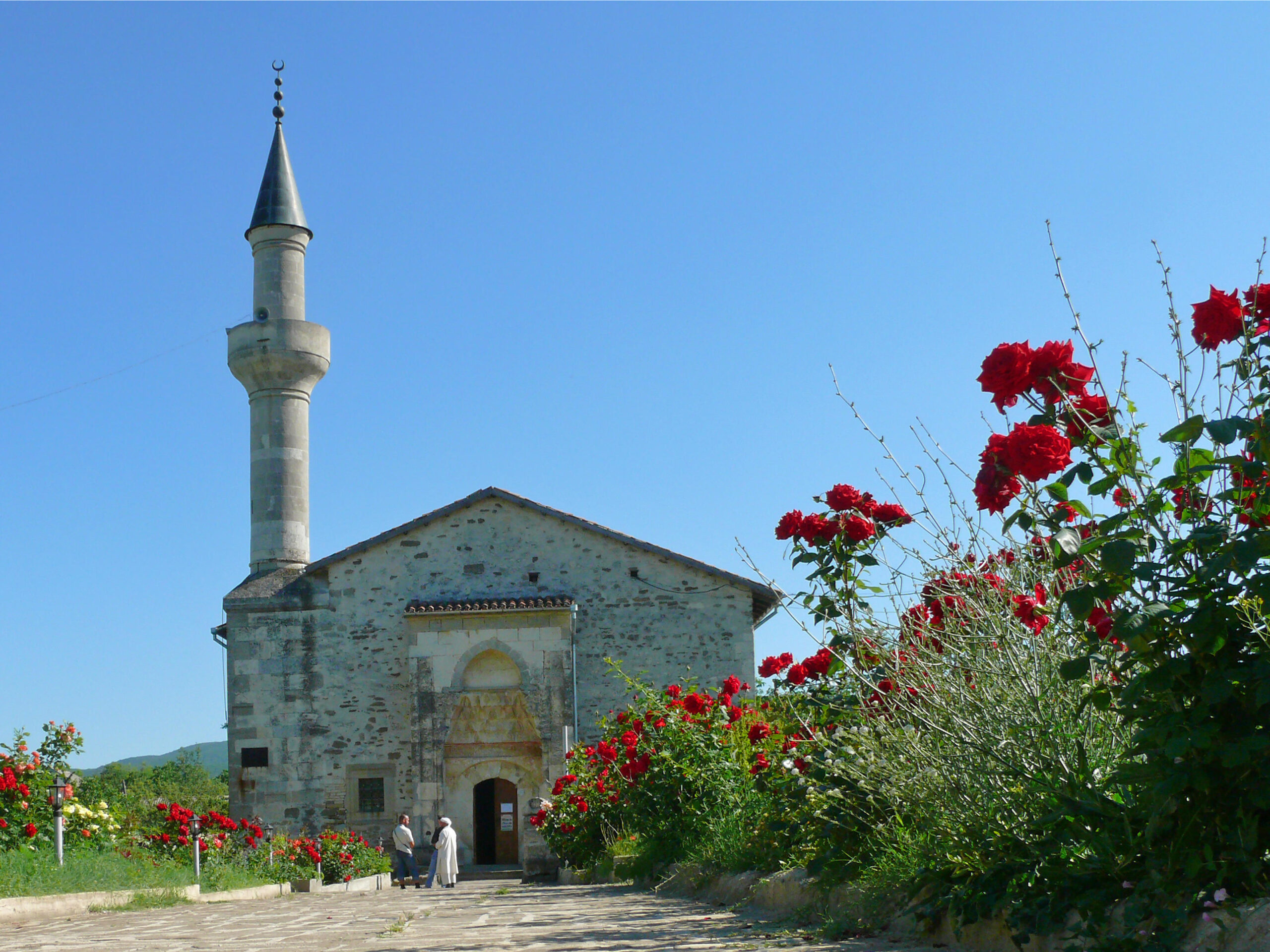
Ozbek Han Mosque — one of the oldest mosques of the Crimea, built in 1314 during the rule of the Golden Horde in the peninsula. (Piotr Matyga, CC BY-SA 4.0, Wikimedia Commons)
Percy Cradock, a veteran British diplomat and intelligence supremo, warned the situation “excites strong emotions in Crimea and amongst the powerful nationalist lobby in Kiev (as well as in Moscow).”
He believed: “There must be a real possibility that the situation will slip out of control. That could mean violence in Crimea, and serious confrontation between Russia and Ukraine.”
Ukraine’s Sovereignty Questioned
In the event, there was a messy compromise. Crimea’s parliament declared independence, while also acknowledging Ukraine’s authority. Yet the situation remained volatile.
Major’s foreign policy advisor and former ambassador to Moscow, Rodric Braithwaite, wrote a confidential background note that would today be considered heretical.
Donate to CN’s 2022 Fall Fund Drive
“It is not entirely clear, even to the Ukrainians, still less to the Russians, that Ukraine is a real country,” Braithwaite noted. “Hence the tensions between the two.”
Braithwaite, who went on to chair the Joint Intelligence Committee later in 1992, gave the prime minister a potted history of the region, stretching back to the Middle Ages. He highlighted the “artificial famine which [Soviet leader Joseph] Stalin imposed on the Ukraine in 1930-31, when many millions of peasants were deported or starved to death.”
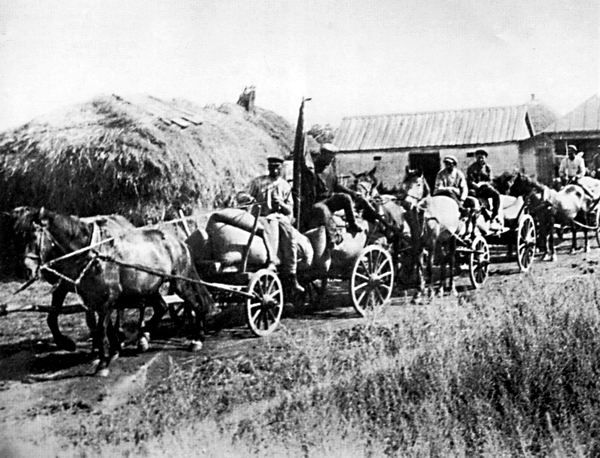
Soviet carts in the village of Oleksiyivka, Kharkiv oblast, in 1932 taking the harvest away from the peasants and creating the Holodomor, a manmade famine. (Central State Audiovisual Archives of Ukraine, Public Domain)
“So it was not surprising then very many Ukrainians greeted the Germans as liberators in 1941, and that large numbers agreed to join the German army,” Braithwaite reasoned, referring to Nazi collaborators during World War II.
‘An Integral Part of Russia’
Although these resistance groups were ultimately defeated by Stalin, Ukrainian nationalism survived as a political movement. “Throughout 1990 the number and size of popular demonstrations for independence swelled,” Braithwaite noted, adding that Russia looked like an “empire” to Ukrainians.
On the other hand, he said: “Russians would simply not recognise the picture. For Russians, the Ukraine is an integral part of Russia, its history and its culture. The Ukrainian language is no more than a dialect.”
He went on:
“I have not met a single Russian, even among the most sophisticated, who really believes that the Ukraine is now permanently severed from the motherland.”
In a candid remark, Braithwaite said:
“The Ukrainians know that. They also know that Ukraine itself is divided: between the ultra-nationalist … Western Ukraine … and the East which is predominantly inhabited by ethnic Russians.”
As tensions escalated, a confidential Whitehall planning paper warned: “We need to pay more attention to Ukraine.” It noted there were “fears over long term allegiance of ethnic Russian minority (22% of population)” and concerns that President Boris Yeltsin “will be replaced by nationalists/neo-imperialists” in the Kremlin.
‘Reabsorbed by Russia’
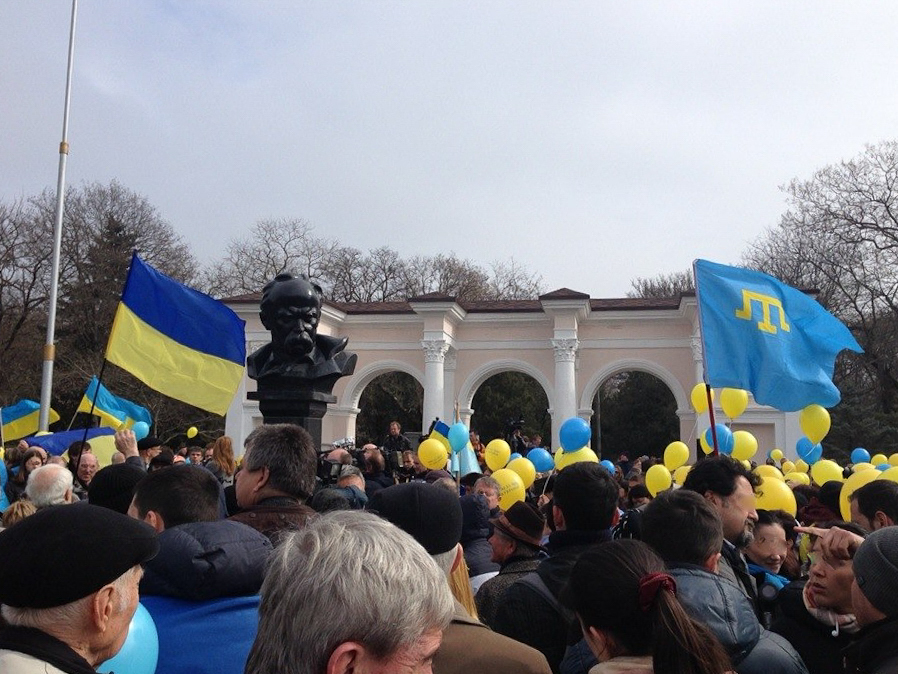
Pro-Ukrainian rally in Simferopol, Crimea, 2014. (Devlet Geray, CC BY-SA 4.0, Wikimedia Commons)
At the end of 1993, Foreign Office planners thought “Ukraine might be reabsorbed by Russia unless it faced up to the need for painful economic and political reforms” to make it less dependent on money from Moscow.
Ukraine’s deputy foreign minister, Borys Tarasyuk, did not dispute the analysis when British diplomats came to Kiev to meet him in early 1994 for “some six hours of confidential exchanges.”
Tarasyuk believed Moscow “was determined to try to assert as much control as possible over all the republics of the former Soviet Union” and would “use the well tried strategy of destabilising their neighbours in order to justify intervention”.
The Ukrainian politician was apparently “particularly exercised about the Crimea where recent elections have demonstrated the strength of pro-Russian separatist feeling.”
Roger Bone, a senior British diplomat who would later run arms giant Boeing, “reassured Tarasyuk that the West was very much alive to the risk of a shift in Russian foreign policy” and “would not acquiesce in the re-establishment of a Russian sphere of influence.”
Battle for Influence
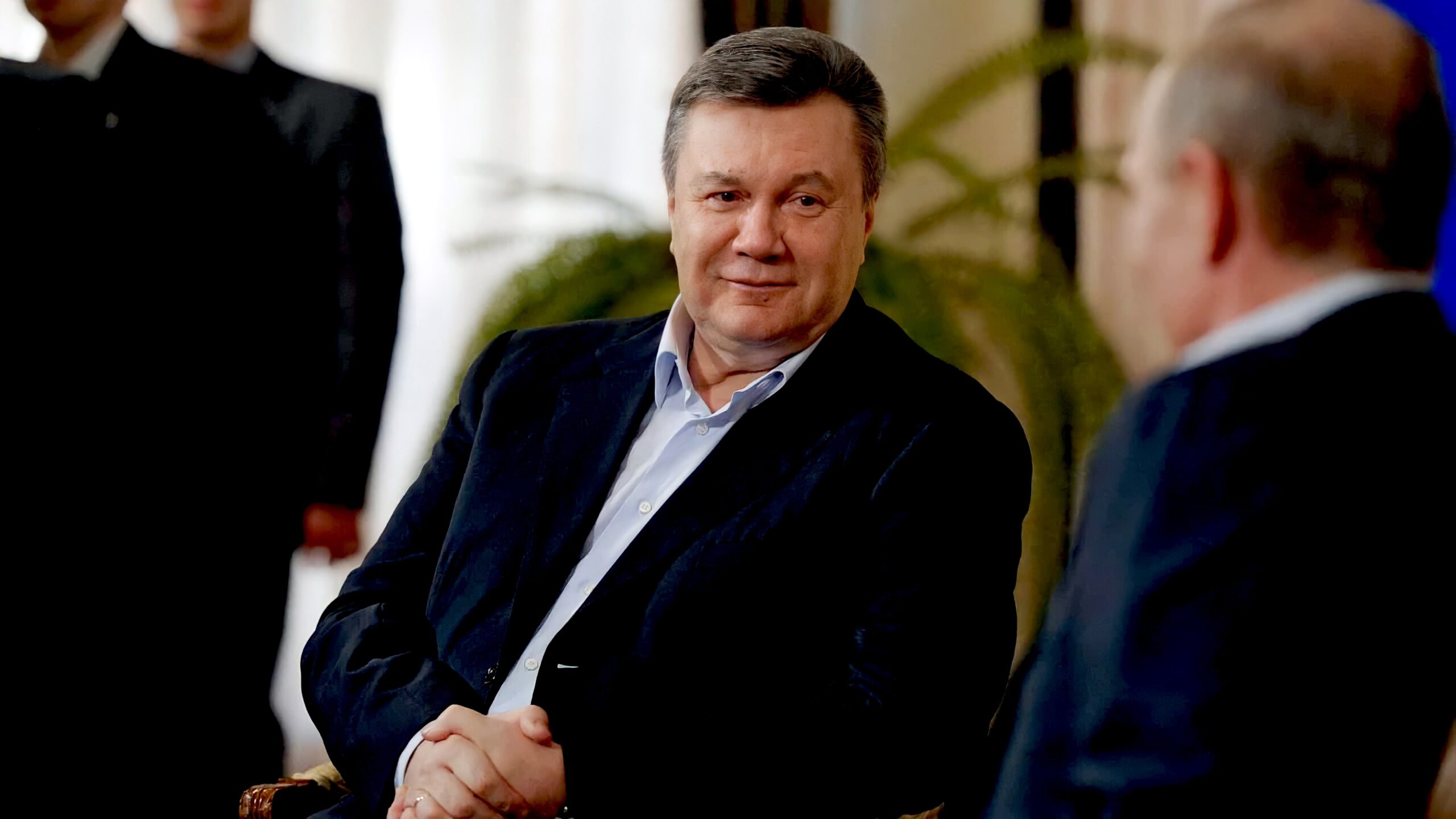
President of Ukraine Viktor Yanukovych in March 2013, Russian President Vladimir Putin on right. (Kremlin, CC BY 4.0, Wikimedia Commons)
Plans were made to bring Ukraine’s economy into the Western orbit, through promoting privatisation and engagement with the International Monetary Fund. Financial aid was to be conditional on Ukraine restructuring its economy towards a free-market model.
It would take another 20 or 30 years for the significance of these discussions to become fully apparent. In 2014, Ukraine’s democratically elected president was toppled in a popular “coup” after he opted for an economic deal with Russia instead of the European Union.
Russia, now led by the nationalist Vladimir Putin, reacted to the loss of his ally by annexing Crimea. Residents supposedly voted by 97 percent to join Russia in a referendum, which was boycotted by Tatars and not recognised by Britain.
Meanwhile, Moscow helped destabilise Ukraine’s eastern Donbas region, by backing separatist rebels in Donetsk and Luhansk. Peace talks failed and the conflict dramatically escalated this February when Putin launched a full-scale invasion of Ukraine.
Putin is now repeating his referendum tactic by holding disputed polls in the Donbass, despite the ongoing war. While British intelligence has recently won credit for predicting the conflict, the declassified files make clear this was a risk Whitehall had long known about.
Phil Miller is Declassified UK’s chief reporter. He is the author of Keenie Meenie: The British Mercenaries Who Got Away With War Crimes. Follow him on Twitter at @pmillerinfo
This article is from Declassified UK.
The views expressed are solely those of the author and may or may not reflect those of Consortium News.
Donate Today to CN’s
2022 Fall Fund Drive
Donate securely by credit card or check by clicking the red button:


I re-read your article, Phil Miller.
Quote:1- “In 2014, Ukraine’s democratically elected president was toppled in a popular “coup” after he opted for an economic deal with Russia instead of the European Union.”
Learn more about the events in Odessa and what Victoria Nuland did on December 11, 2013 in Kyiv.
2- “At the end of 1993, Foreign Office planners thought “Ukraine might be reabsorbed by Russia ”
And when was the first absorption of Ukraine? In 1654, when the population of Little Russia asked to be reunited with Russia? Then these people were called Little Russians, not Ukrainians.
I still have a lot of questions about your article, but there is no point in continuing because you only used the facts that were published in the English media.
“Residents [of Crimea] supposedly voted by 97 percent to join Russia in a referendum,
which was boycotted by Tatars and not recognised by Britain.”
“supposedly” — Aside from Western propaganda, is there any evidence that the vote was not overwhelming?
This article fails to give any concrete evidence for predicting the Ukraine war while repeating the historical revisionism favoured by Ukrainian nationalism and the West. This war is the result of deliberate US/UK policies and not of an inevitable course of history predicted 30 years ago. Ukrainian nationalism was deliberately cultivated by the Habsburgs, Poles, the Nazis, the UK, US, Canada and the Diaspora of the descendents of Ukrainian Nazis to serve as a fighting force against Russia.
Unless you want to give Crimea back to the Mongols or the Ottoman Empire, Crimea is Russian. There is really nothing Ukrainian about it. The West manufactured the “annexation narrative” to escalated relations with Russia. The Skripal affair also served that purpose. In fact, the “annexation narrative” is based on historical revisionism:
– Khrushchev “gifted” Crimea to Ukraine because he was Ukrainian.
– The “gift” was never ratified by the Duma or the Rada.
– Crimea always retained an autonomous status.
– Crimea became independent of the Soviet Union in 1991 by popular referendum about 9 months before Ukraine became independent.
– Crimea remained independent until 1995 when Ukraine ANNEXED Crimea by force. Ie., at the time of the Budapest Memorandum in 1994 Crimea wasn’t even part of Ukraine.
– Even after 1995, Crimea retained an autonomous status.
– Crimea REUNITED with the Russian Federation by popular referendum WITHOUT interference from Russia. The so-called “little green men” where soldiers of the Ukrainian territorial army. Of the 22,000 troops of the Ukrainian territorial army of Crimea, 20,000 supported the independence referendum. The remaining 2,000 were allowed to move to Ukraine without their weapons.
– The 2014 Maidan coup was not a “popular coup or revolution”. It was a US-backed fascist coup designed to bring a nationalist government to power to escalate relations with Russia, as described by the neo-Nazi C14 leader Karas: “the Maidan would have been a gay parade if the far-right hadn’t escalated the violence” (and if the US hadn’t backed the coup).
– The anti-Maidan was a popular movement against the fascist coup, which led to thousands demonstrations all across the South and the East and to the creation of 5 independent republics from Odessa to Kharkiv.
– While the armed forces had tolerated the violent Maidan coup against the elected president, the army and armed fascists groups brutally suppressed the anti-Maidan movement with massacres in Odessa, Mariupol, Kherson, etc.
– Of the 5 independent republics only the republics of Donetsk and Luhansk resisted because the Ukrainian territorial army of the Donbass supported the independence movement. Many criticized Putin for not assisting the ethnic Russians in 2014.
– There were no Russian troops in Ukraine prior to Feb. 2022. The support Russia gave to the republics did not exceed the support Nato countries gave to the Kyiv regime.
– The Holodomor was not a crime committed by Russians against Ukrainians, it was a result of Stalin’s policies that affected all citizens of the Soviet Union. Stalin wasn’t even Russian. Even though the Ukrainians of the Donbass were affected by the Holodomor, they are still pro-Russian today, while the Ukrainian Bandera nationalists of Galicia, who use the Holodomor victimhood narrative, were not affected by the Holodomor, because they weren’t part of the Soviet Union at the time.
But yeah, there is nothing that will stop the West from adopting the historical revisionism of Ukrainian nationalism to fight its war against Russia.
Don’t overlook the emotional significance of the Crimean War of 1853-56 to Russia today. 100,000 Russian servicemen gave their lives defending Sebastopol from an Anglo-French invasion force. Accordingly, that Crimean city, founded by Catherine the Great in 1784, is sacred in Russian memory the way the Alamo is sacrosanct to Texans. This explains why Putin moved decisively to protect Crimea from the 2014 CIA coup in Kiev. The official casus belli for the nineteenth century assault on the Czar was nonsense: the real cause was fear of Russia’s growing economic and military strength. Western imperialists habitually misinterpret nations asserting their rightful sovereignty as existential threats to their survival. It is still absolutely verboten to acknowledge the extent to which Japan and Germany offered practical, reasonable compromises to avoid war with massively superior hostile powers whose aggression they knew they stood no chance of surviving militarily.
“Whitehall knows about it and was silent, why?” is the tone i gather here. You forget the RAND Paper that was written later. At this point British don’t do independent foreign policy anymore and Langley didn’t care about that analysis because it don’t threatens the US. UK is like the Rest of Europe a poodle of the Empire and has nothing to say anymore.
Mr. Miller is to be congratulated for writing on the declassified materials, but it’s puzzling how unaware he seems of so much that is publicly known. He writes about the 2014 coup overthrowing Ukraine’s democratically-elected president without any mention of the US role in orchestrating it or the neo-Nazis spearheading it that the US backs to this day. The context is really important in understanding why so many ethnic-Russians were anxious to leave Ukraine and join back with Russia.
Miller faults Moscow for helping to “destabilize Ukraine’s eastern Donbas region” but nowhere mentions that for the almost 8 years the Kiev government bombed and shelled those very same regions leading to some 14,000 deaths according to the OSCE.
He says peace talks “failed” though in fact Ukraine ignored its obligations under the Minsk 1 and Minsk 2 accords, and Ukraine’s ex-President later admitted Ukraine had entered into the agreements merely to “buy” time for a military build-up.
Miller says the recent referenda are “disputed” though he doesn’t specifically say why they should be, nor does he offer any evidence that their outcomes were false or even tainted. He says they were held “despite the ongoing war”, but that’s hardly the first time a vote has taken place during a war. The US organized elections while making war in Afghanistan and Iraq without the UK or EU disputing them.
Mr Miller provides some good information about the declassified documents, but he has undermined his credibility with his oversights.
Your critical comment is absolutely right. In 1991 Ukraine inherited a large territory and important Russian and other minorities. Ukraine had the opportunity to live in a normal and friendly relationship with Russians, but Ukrainian nationalists adopted such extreme positions and treated so bad their own population, that they spoiled any possibility of peaceful living. Ukraine is a failed state. The responsibility of the USA and their allies in playing with Ukrainian nationalists is very important, so that their apparent “bonne conscience “ is absolutely unbearable.
This article seems to me to be biased in the extreme.
Many of the stories told us by Western media to support the US/NATO proxy war on the Russia Federation are trotted out and thereby normalized. This point of view might reflect what John Major’s advisors thought to be the case in the mid 1990’s. However, Phil Miller is speaking in his own voice when he designates the coup in 2014 “popular” and neglects to mention the part of Victoria Nuland and the NATO training of neo-Nazi forces before and after the coup. He shows his bias by throwing in the word “supposedly” when referring to the Crimean referendum to join the Russian Federation. When asserting that “Moscow helped destabilize Ukraine’s eastern Donbas region” he neglects to inform his readers of the laws enacted by the post coup government of the Ukraine, taking away the language and cultural rights of the Russian population. Nor does he mention the massacre in Odessa against people protesting having their language rights abolished. He does not go into why peace talks failed repeatedly.
Agreed. I wondered if the prediction also included the 2014 US Coup urging and settin up the proxy war.
Absolutely agree with you.
No goodies and badies in this war – or this world. Just lots of looking after our own interests, no matter who the individual, society or nation, at the expense of those who don’t follow our way of thinking.
Who do you mean when you say “our interests”? Whose “way of thinking” are you talking about? You could be clearer.